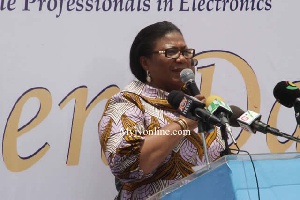As part of efforts to reduce the high prevalence of anaemia among girls, First Lady Rebecca Akufo-Addo has launched the Girls’ Iron and Folic Acid supplementation (GIFTS) programme, at Sunyani in the Brong Ahafo Region.
The GIFTS programme, initiated by the Ghana Health Service (GHS) would run in phases with the first targeting about 360,000 in-school adolescent girls and close to 600,000 out of school girls, in four of the regions.
Launching the initiative, Mrs Akufo-Addo noted that was a serious public health problem that affected women, adolescent girls and children.
Mrs Akufo-Addo said since most adolescents did not have access to information on, it was important to reach out to them through school teachers, school principals, youth clubs and health workers in the community in order to achieve better results.
She entreated all stakeholders to support the programme to ensure its success by becoming champions of the initiative to help reduce prevalence in Ghana.
She disclosed that current data indicated that four in 10 women were anaemic in Ghana; with about half of all adolescent girls and pregnant women also being anaemic.
She explained that in adolescents, limited their development, learning ability, reduced their concentration in daily tasks, increased their vulnerability to dropping out of school and reduced their physical fitness and work productivity; generally depriving adolescent girls of the ability to attain their fullest potential.
She said: “If for any unfortunate reason an anaemic adolescent girl becomes pregnant, she has a higher risk of delivering a premature baby, a low birth weight baby or even tragically dying during or after delivery.”
In the light of these risk factors, the First Lady said that the problem of in adolescent girls should be treated with urgency, while the required investment in their nutrition be made.
Expert had noted, she said, that though the best solution to in adolescent girls, was to give them nutrient-rich food with additional meat, liver, chicken, egg or fish, it was also important to supplement that by providing the girls with iron foliate supplements routinely for immediate health and developmental benefits.
These supplements, she indicated, would help improve iron stores, which in turn helped them stay alert in class, and have the energy to perform physical activities both at school and at home.
The First Lady explained that experts had assured that the GIFTS programme was highly cost-effective but the benefits far outweighed the costs.
“When we invest in adolescent nutrition now, they will stay in school longer, perform better in school and ultimately we will create a more productive labour force, which is a crucial precondition for economic development,” she noted.
She said the success of GIFTS also “depends on effective and sustained communication through multiple channels on the benefits and safety of the supplements to ensure greater acceptance and adherence to supplementation schemes as well as allay fears about possible side effects.”
Health News of Thursday, 12 October 2017
Source: ghananewsagency.org

















